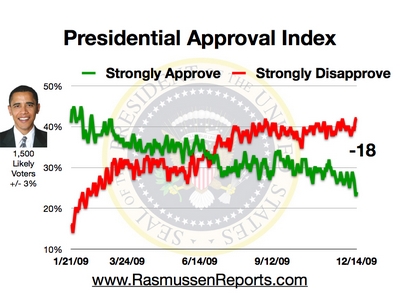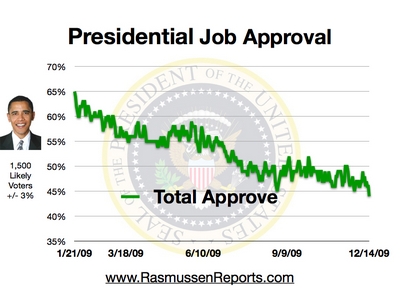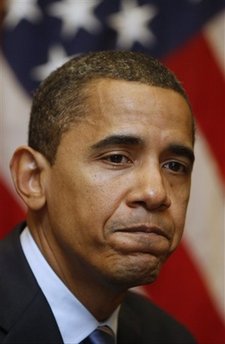The president always knew that his greatest appeal was not as a leader but as a cultural symbol.
By SHELBY STEELE
America still has a race problem, though not the one that conventional wisdom would suggest: the racism of whites toward blacks. Old fashioned white racism has lost its legitimacy in the world and become an almost universal disgrace.The essence of our new "post-modern" race problem can be seen in the parable of the emperor's new clothes. The emperor was told by his swindling tailors that people who could not see his new clothes were stupid and incompetent. So when his new clothes arrived and he could not see them, he put them on anyway so that no one would think him stupid and incompetent. And when he appeared before his people in these new clothes, they too—not wanting to appear stupid and incompetent—exclaimed the beauty of his wardrobe. It was finally a mere child who said, "The emperor has no clothes."
The lie of seeing clothes where there were none amounted to a sophistication—joining oneself to an obvious falsehood in order to achieve social acceptance. In such a sophistication there is an unspoken agreement not to see what one clearly sees—in this case the emperor's flagrant nakedness.
Barack Obama, elegant and professorially articulate, was an invitation to sophistication that America simply could not bring itself to turn down. If "hope and change" was an empty political slogan, it was also beautiful clothing that people could passionately describe without ever having seen.
Mr. Obama won the presidency by achieving a symbiotic bond with the American people: He would labor not to show himself, and Americans would labor not to see him. As providence would have it, this was a very effective symbiosis politically. And yet, without self-disclosure on the one hand or cross-examination on the other, Mr. Obama became arguably the least known man ever to step into the American presidency.
Our new race problem—the sophistication of seeing what isn't there rather than what is—has surprised us with a president who hides his lack of economic understanding behind a drama of scale. Hundreds of billions moving into trillions. Dramatic, history-making numbers. But where is the economic logic behind a stimulus package that doesn't fully click in for a number of years? How is every stimulus dollar spent actually going to stimulate? Why bailouts to institutions that only hoard the money? How is vast government spending simultaneously a kind of prudence that will not "add to the deficit?" How can such spending not trigger smothering levels of taxation?
Mr. Obama's economic thinking (or lack thereof) adds up to a kind of rudderless cowboyism combined with wishful thinking. You would think that in the two solid years of daily campaigning leading up to his election this nakedness would have been seen.
On the foreign front he has been given much credit for his new policy on the Afghan war, and especially for the "rational" and "earnest" way he went about arriving at the decision to surge 30,000 new troops into battle. But here also were three months of presidential equivocation for all the world to see, only to end up essentially where he started out.
And here again was the lack of a larger framework of meaning. How is this surge of a piece with America's role in the world? Are we the world's exceptional power and thereby charged with enforcing a certain balance of power, or are we now embracing European self-effacement and nonengagement? Where is the clear center in all this?
I think that Mr. Obama is not just inexperienced; he is also hampered by a distinct inner emptiness—not an emptiness that comes from stupidity or a lack of ability but an emptiness that has been actually nurtured and developed as an adaptation to the political world.
The nature of this emptiness becomes clear in the contrast between him and Ronald Reagan. Reagan reached the White House through a great deal of what is called "individuating"—that is he took principled positions throughout his long career that jeopardized his popularity, and in so doing he came to know who he was as a man and what he truly believed.
He became Ronald Reagan through dissent, not conformity. And when he was finally elected president, it was because America at last wanted the vision that he had evolved over a lifetime of challenging conventional wisdom. By the time Reagan became president, he had fought his way to a remarkable certainty about who he was, what he believed, and where he wanted to lead the nation.
Mr. Obama's ascendancy to the presidency could not have been more different. There seems to have been very little individuation, no real argument with conventional wisdom, and no willingness to jeopardize popularity for principle. To the contrary, he has come forward in American politics by emptying himself of strong convictions, by rejecting principled stands as "ideological," and by promising to deliver us from the "tired" culture-war debates of the past. He aspires to be "post-ideological," "post-racial" and "post-partisan," which is to say that he defines himself by a series of "nots"—thus implying that being nothing is better than being something. He tries to make a politics out of emptiness itself.
But then Mr. Obama always knew that his greatest appeal was not as a leader but as a cultural symbol. He always wore the bargainer's mask—winning the loyalty and gratitude of whites by flattering them with his racial trust: I will presume that you are not a racist if you will not hold my race against me. Oprah Winfrey, Michael Jordan and yes, Tiger Woods have all been superb bargainers, eliciting almost reverential support among whites for all that they were not—not angry or militant, not political, not using their moral authority as blacks to exact a wage from white guilt.
But this mask comes at a high price. When blacks become humanly visible, when their true beliefs are known, their mask shatters and their symbiotic bond with whites is broken. Think of Tiger Woods, now so humanly visible. Or think of Bill Cosby, who in recent years has challenged the politically correct view and let the world know what he truly thinks about the responsibility of blacks in their own uplift.
It doesn't matter that Mr. Woods lost his bargainer's charm through self-destructive behavior and that Mr. Cosby lost his through a courageous determination to individuate—to take public responsibility for his true convictions. The appeal of both men—as objects of white identification—was diminished as their human reality emerged. Many whites still love Mr. Cosby, but they worry now that expressing their affection openly may identify them with his ideas, thus putting them at risk of being seen as racist. Tiger Woods, of course, is now so tragically human as to have, as the Bible put it, "no name in the street."
A greater problem for our nation today is that we have a president whose benign—and therefore desirable—blackness exempted him from the political individuation process that makes for strong, clear-headed leaders. He has not had to gamble his popularity on his principles, and it is impossible to know one's true beliefs without this. In the future he may stumble now and then into a right action, but there is no hard-earned center to the man out of which he might truly lead.
And yes, white America conditioned Barack Obama to emptiness—valued him all along for his "articulate and clean" blackness, so flattering to American innocence. He is a president come to us out of our national insecurities.
Mr. Steele is a senior research fellow at Stanford University's Hoover Institution.












